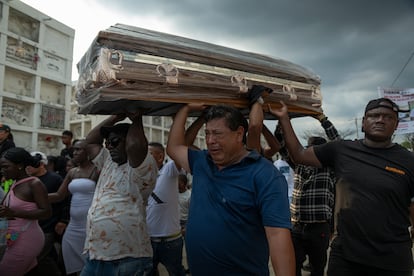‘They were tortured’: Ecuadorian soldiers confess to beating four murdered children in Guayaquil
Four of the 16 detained soldiers claim they left the minors ‘alive’ after staging a mock execution


Four months have passed since the murder of the four children in Las Malvinas, Guayaquil, was confirmed, and one thing is certain: they were tortured by members of the Ecuadorian Air Force (FAE). Four of the 16 soldiers prosecuted in the case admitted that their victims were beaten, punched, and subjected to a mock execution before being abandoned naked in Taura, a rural parish south of Guayaquil, taken over, like so many others, by organized crime.
From the beginning, the military’s version of events was that the children were criminals and had been left alive. But on April 27, during the second reconstruction of the events, four of the accused confessed to the extreme violence inflicted on the minors at the hands of a second lieutenant, a sergeant, a corporal, and a soldier. The confessions came as part of a plea agreement that reduced their sentences in exchange for information and saw the detainees transferred to Prison No. 4 in Quito, which is primarily used for politicians.
“It was a journey of death, where the children endured an ordeal full of threats, insults, torture, and a simulated execution to make them confess to a nonexistent crime,” said Abraham Aguirre, the families’ lawyer.
The reconstruction of events took place at three locations, according to Aguirre, who was present. The first was on the Durán–Tambo highway — south of the coastal city of Guayaquil — where the patrol pulled the children from the truck and threatened them. One version claims there is a video showing one of the officers stepping on the victims.

The second location was the toll booth on the Durán–Tambo road, where the 11-year-old boy and the three teenagers, aged 14 and 15, were forcibly taken out of the vehicle. They were thrown from the bed of the pickup truck to the ground and forced to kneel with their hands behind their backs. It was there that one of the soldiers fired a shot at the ground near one of the minors, attempting to simulate an execution. According to one version recounted by Aguirre, “a noncommissioned officer beat one of the teenagers.”
The same beating was repeated in Taura, the final location, where they were forced to strip in the dead of night and in the middle of nowhere. From that moment, the account of the four cooperating soldiers is consistent: they claim they left the minors alive. They distanced themselves, just like the other 12 military personnel, from the subsequent murder of the kids.
“They say that, after doing all of that, they left them safe and sound. That they drove away and don’t know what happened next. Essentially, they’re saying: yes, we beat them, but they were still alive,” Aguirre stated critically.
The children were not seen again until December 31, 2024, when the Prosecutor’s Office confirmed that the burned remains found in a swampy area of Taura belonged to Steven Medina (11), Nehemías Arboleda (15), and brothers Ismael (15) and Josué Arroyo (14).
The parents of the children learned about the soldiers’ confessions with the support of the psychological team from the Permanent Committee for the Defense of Human Rights (CDH) in Guayaquil, which has been providing assistance to the families since March. Nathalia Santos, one of the psychologists, explained that only those who were ready received the report.
The soldiers’ testimony confirms what human rights organizations and the victims’ families had already asserted months earlier: the children were tortured. According to Aguirre, “all these elements revealed in the reconstruction of events could increase the severity of the sentence.”
Forced disappearance in Ecuador is punishable by 22 to 26 years in prison, according to the Comprehensive Criminal Code. It is also a crime that, under Ecuadorian law, has no statute of limitations, adds Efrén Guerrero, professor of public international law at the Pontifical Catholic University of Ecuador.
“[The versions] reaffirm the existence of a scenario that could be considered forced disappearance,” said Guerrero. “The confessions show the participation of state agents, the deprivation of liberty of the minors, and then a refusal to acknowledge the facts or provide information for several days.”
Guerrero points out that all these elements strengthen the case’s credibility and could facilitate its admissibility before the United Nations Committee on Enforced Disappearances. María Dolores Miño, director of the Observatory of Rights and Justice, warns that the case could escalate to international courts if the Ecuadorian state fails to fulfill its obligations for full reparations. These include a proper investigation and punishment of those responsible, the families’ right to know the truth, and financial compensation.
Ecuador has a history of human rights violations. Of the 553 rulings issued by the Inter-American Court of Human Rights, 53 (9.58%) involve Ecuador. “We are the country with the third-highest number of cases. There is a structural situation of impunity that is not being resolved,” warned Guerrero.
Two days after the soldiers’ confessions, on April 30, the investigation was closed, having gathered testimonies, expert analyses, and two reconstructions of the events on the day the children were intercepted by a military squad, beginning the nightmare for their families. On May 1, the prosecutor handling the case requested that the judge of the South Criminal Judicial Unit of Guayaquil set a date and time for the preliminary trial hearing against the 16 military personnel implicated in the children’s disappearance.
Sign up for our weekly newsletter to get more English-language news coverage from EL PAÍS USA Edition
Tu suscripción se está usando en otro dispositivo
¿Quieres añadir otro usuario a tu suscripción?
Si continúas leyendo en este dispositivo, no se podrá leer en el otro.
FlechaTu suscripción se está usando en otro dispositivo y solo puedes acceder a EL PAÍS desde un dispositivo a la vez.
Si quieres compartir tu cuenta, cambia tu suscripción a la modalidad Premium, así podrás añadir otro usuario. Cada uno accederá con su propia cuenta de email, lo que os permitirá personalizar vuestra experiencia en EL PAÍS.
¿Tienes una suscripción de empresa? Accede aquí para contratar más cuentas.
En el caso de no saber quién está usando tu cuenta, te recomendamos cambiar tu contraseña aquí.
Si decides continuar compartiendo tu cuenta, este mensaje se mostrará en tu dispositivo y en el de la otra persona que está usando tu cuenta de forma indefinida, afectando a tu experiencia de lectura. Puedes consultar aquí los términos y condiciones de la suscripción digital.








































